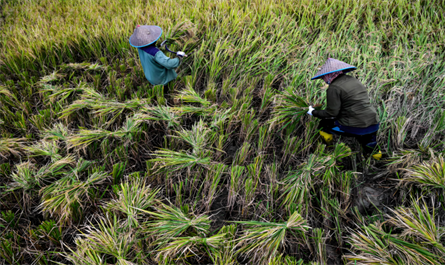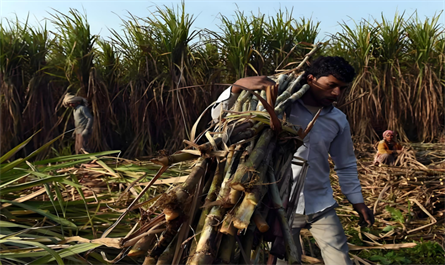Sustainable Agricultural Practices and Traditional Crop Cultivation in Indonesia
Indonesia is a country blessed with abundant natural resources and a diverse crop landscape. Agriculture plays a vital role in the country's economy and food security. However, with population growth and economic development, Indonesian agriculture faces numerous challenges, including land degradation, water shortages, and environmental pollution. To address these challenges and ensure sustainable agricultural development, Indonesia has explored various sustainable agricultural practices while maintaining the importance of traditional crop cultivation.

I. Sustainable Agricultural Practices
1. Water-Saving Techniques for Rice Cultivation
Rice is Indonesia's staple food crop, but rice cultivation requires significant amounts of water. To address water scarcity, Indonesia has introduced water-saving irrigation systems, such as drip and sprinkler irrigation, to reduce water waste and increase rice yields.
2. Organic Agriculture
Organic agriculture is gaining increasing attention and popularity in Indonesia. Organic agriculture utilizes natural fertilizers and biological control methods, avoiding the use of chemical fertilizers and pesticides, and reducing soil and environmental pollution. Indonesian farmers and the government actively promote organic agriculture and encourage farmers to use organic produce.
3. Agricultural Diversity
To reduce pressure on land and improve crop adaptability, Indonesia is committed to increasing agricultural diversity. By cultivating diverse varieties and promoting a variety of crops, farmers can reduce planting risks and minimize the spread of pests and diseases.
II. The Importance of Traditional Crop Cultivation
Despite the pressures of modern agricultural development in Indonesia, traditional crop cultivation remains crucial.
1. Genetic Resource Conservation
Traditional crops, including rice, corn, and vegetables, are among Indonesia's rich genetic resources. These traditional crops possess diverse genetic traits and are adaptable to diverse environmental and climatic conditions. Preserving and promoting the cultivation of traditional crops can maintain the balance of rural ecosystems and promote the sustainable development of local communities.
2. Regional Development
Indonesia boasts a wide range of geographical and climatic conditions, resulting in diverse agricultural characteristics across different regions. The cultivation of traditional crops enables each region to develop its own unique agricultural industries, thereby boosting local economies and increasing farmers' incomes.
3. Cultural Heritage
Agriculture plays a vital role in Indonesian society and culture, and traditional crop cultivation is a crucial component of Indonesian agricultural culture. Preserving and developing traditional crop cultivation can maintain the traditions and values of agricultural culture and promote the preservation of agricultural heritage.

Conclusion
Sustainable agricultural practices and traditional crop cultivation in Indonesia play an important role in ensuring sustainable agricultural development. By adopting water-saving technologies, promoting organic farming, and increasing agricultural diversity, Indonesia can address agricultural challenges and reduce pressure on natural resources. Furthermore, preserving traditional crop cultivation not only helps preserve genetic resources but also promotes local economic development and the preservation of agricultural culture. Indonesia should continue to support and promote these agricultural practices to achieve the goal of sustainable agricultural development.
If you require plant growth regulators in Indonesia, please contact admin@agriplantgrowth.com

I. Sustainable Agricultural Practices
1. Water-Saving Techniques for Rice Cultivation
Rice is Indonesia's staple food crop, but rice cultivation requires significant amounts of water. To address water scarcity, Indonesia has introduced water-saving irrigation systems, such as drip and sprinkler irrigation, to reduce water waste and increase rice yields.
2. Organic Agriculture
Organic agriculture is gaining increasing attention and popularity in Indonesia. Organic agriculture utilizes natural fertilizers and biological control methods, avoiding the use of chemical fertilizers and pesticides, and reducing soil and environmental pollution. Indonesian farmers and the government actively promote organic agriculture and encourage farmers to use organic produce.
3. Agricultural Diversity
To reduce pressure on land and improve crop adaptability, Indonesia is committed to increasing agricultural diversity. By cultivating diverse varieties and promoting a variety of crops, farmers can reduce planting risks and minimize the spread of pests and diseases.
II. The Importance of Traditional Crop Cultivation
Despite the pressures of modern agricultural development in Indonesia, traditional crop cultivation remains crucial.
1. Genetic Resource Conservation
Traditional crops, including rice, corn, and vegetables, are among Indonesia's rich genetic resources. These traditional crops possess diverse genetic traits and are adaptable to diverse environmental and climatic conditions. Preserving and promoting the cultivation of traditional crops can maintain the balance of rural ecosystems and promote the sustainable development of local communities.
2. Regional Development
Indonesia boasts a wide range of geographical and climatic conditions, resulting in diverse agricultural characteristics across different regions. The cultivation of traditional crops enables each region to develop its own unique agricultural industries, thereby boosting local economies and increasing farmers' incomes.
3. Cultural Heritage
Agriculture plays a vital role in Indonesian society and culture, and traditional crop cultivation is a crucial component of Indonesian agricultural culture. Preserving and developing traditional crop cultivation can maintain the traditions and values of agricultural culture and promote the preservation of agricultural heritage.

Conclusion
Sustainable agricultural practices and traditional crop cultivation in Indonesia play an important role in ensuring sustainable agricultural development. By adopting water-saving technologies, promoting organic farming, and increasing agricultural diversity, Indonesia can address agricultural challenges and reduce pressure on natural resources. Furthermore, preserving traditional crop cultivation not only helps preserve genetic resources but also promotes local economic development and the preservation of agricultural culture. Indonesia should continue to support and promote these agricultural practices to achieve the goal of sustainable agricultural development.
If you require plant growth regulators in Indonesia, please contact admin@agriplantgrowth.com
RECENT POSTS
-
What are the advantages of plant growth regulators compared to pesticides such as herbicides insecticides and fungicides?
-
Which plant growth regulators should be used under drought stress?
-
Methods for Effective Growth Control and High Yield in Sweet Potatoes
-
Why is the effectiveness of pesticides in the field sometimes poor?
Featured News



